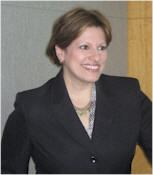In Battle on Capitol Hill, the Real Losers Are Struggling Communities
Guest blog post by NCLR Affiliate Nilda I. Ruiz, President and CEO, Asociación Puertorriqueños en Marcha
 On my way back from Washington, DC, it hit me just how close our nation’s capitol is to Philadelphia and yet how far apart these worlds seem to be. Amid the white marble buildings and towering national monuments, politicos make huge decisions that have such a deep and meaningful impact on the day-to-day lives of people across this nation. But sometimes it’s hard to get a sense of whether they honestly grasp the consequences that their decisions have for the people outside Capitol Hill.
On my way back from Washington, DC, it hit me just how close our nation’s capitol is to Philadelphia and yet how far apart these worlds seem to be. Amid the white marble buildings and towering national monuments, politicos make huge decisions that have such a deep and meaningful impact on the day-to-day lives of people across this nation. But sometimes it’s hard to get a sense of whether they honestly grasp the consequences that their decisions have for the people outside Capitol Hill.
Last week, I had a chance to break that wall down and talk directly with congressional staff about my apprehension over the upcoming budget cuts, or sequestration, set to take place on March 1. My profound concern as the President of Asociación Puertorriqueños en Marcha (APM), a community-based organization, is far from isolated to me; nonprofits throughout the country are staring at the clock as it ticks down to sequestration, thinking about which programs are going to be shelved.
At APM, we are incredibly fortunate to be able to provide comprehensive services to struggling families in the Philadelphia area. We offer everything from early education for children to outpatient drug and alcohol treatment to a financial literacy program. We’ve built hundreds of houses and apartments for people of low and moderate income, developed our own successful mortgage counseling program in partnership with NCLR, and built the TruMark credit union building, which has brought banking back to a neighborhood after 50 years of red lining.
So what happens after March 1? Are we going to have to cut our foster care and adoption services? Will single parents lose out on the child care that we provide? Maybe we’ll have to slash the aid and cut back on the meals that we deliver to people living with HIV. The point is that although these cuts make it incredibly difficult for us to operate as an organization, the real losers are our clients—the 9,000 people in greater Philadelphia who depend on us for these services.
At the National Hispanic Leadership Agenda congressional briefing, I spoke about one of our clients, Norma Morales, who came to us in dire need of help after domestic violence left her homeless and deeply afraid. She had a long road ahead of her, but with the assistance of APM’s mental health, job training, employment coaching, and housing counseling services, she has completely broken the cycle of poverty for her and her family. Today, Norma is working for the president of the Philadelphia City Council, has gotten her children through college, and is a homeowner. Her daughter has a good job and just bought a house too.
But for every success story that comes through APM, there are still many more waiting to be realized. The sequestration cuts will destroy our ability to keep our promise to be there for the Philadelphia community when they need us.
People talk about these budget cuts like they are excess, unnecessary spending. Live a day in the life of one of our community members and I promise you, you will see just how important our services and other social agencies and government programs are in building thriving communities. We build a better future for our fellow citizens and this country. The social improvement systems that we create are just as important to this country’s internal health as the Defense Department is to our external safety. APM, NCLR, and organizations like us form the “interior defense systems” that keep this country strong, safe, and progressing in a universally beneficial way.
Listen to Nilda’s interview with KYW News Radio in Philadelphia.
